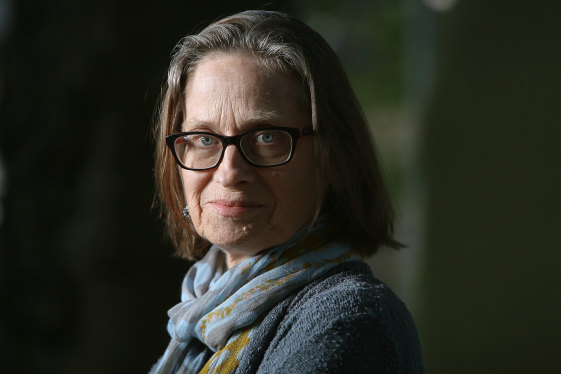Day, Michael Cunningham, Fourth Estate, $32.99
Michael Cunningham was deep into a new book when the pandemic reared its ugly head and forced him to rethink his writing. As he put it: “I thought how could anyone write a novel, a contemporary novel, as if the pandemic wasn’t going on?” What fascinates the American writer, best known for The Hours, in both the fiction he reads and writes, is people. Here his focus is a family in lockdown and already on the verge of disintegration. Elegantly structured and populated with believable and flawed characters, it’s a welcome return to the novel for him.
Lydia Davis makes a statement about book selling in her new collection of stories.Credit: Jeremy Sutton-Hibberd
A Kind of Confession, Alex Miller, Allen & Unwin, $39.99
We have been blessed with Alex Miller’s published works for more than 45 years. He has published 13, frequently prize-winning novels and a beautiful memoir about his friend Max Blatt. But this collection – selected by his wife Stephanie – comes from his early black notebooks, diaries and letters and opens up his writing life to readers. It reveals much of his thought processes about his novels, his early struggles to write and be published and the generosity in his friendships and family relations. If you love his books, you’ll have to read this.
Our Strangers, Lydia Davis, Canongate, $39.99
Lydia Davis makes a statement at the beginning of her latest collection of short – often very short – fiction. Our Strangers will only be sold at brick-and-mortar bookshops and a few selected online retailers. This is because she worries about “monopolistic book selling” and wants to encourage a “diverse publishing ecosystem”. Point made, the reader is treated to her characteristic brevity and briskness – the very opposite of Proust, whose Swann’s Way, she translated – and her “found narratives”.
Charlie Chaplin and Jackie Coogan in his 1921 film The Kid.Credit: AP
Charlie Chaplin vs. America: When Art, Sex, and Politics Collided, Scott Eyman, Simon & Schuster, $55
One of the best films I’ve seen in the past year was a beautifully restored version of Charlie Chaplin’s 1921 The Kid. His genius and deep humanity were on full display: as someone once said, Chaplin was the Picasso of the cinema. He was hugely popular in the US, his adopted home, but things went pear-shaped during World War II. Then in the time of McCarthyism, his politics and morals were deemed suspect and when he left for the 1952 premiere of Limelight in London, his re-entry visa was revoked. As Chaplin told reporters when he heard of the ban: “I am an individualist and believe in liberty. That is as far as my political convictions go.”
Frank Moorhouse: Strange Paths, Matthew Lamb, Knopf, $45
Just like with a bus, when you’ve waited for ages … along come two. Earlier this year, Catharine Lumby’s biography based around her friendship with the great novelist and short-story writer was published. As our reviewer said at the time, “There remains scope for more literary-biographical work on [the] books, and on Moorhouse’s career and reception as a writer.” Here is the first volume of Matthew Lamb’s two-part life, which he has been working on for more than eight years. Lamb also knew Moorhouse well and chronicled his life, work and times up to 1978. As he has written about Moorhouse, “establishing the facts, and disentangling fact from legend, is not as straightforward as one would hope”.
Matthew Lamb’s first volume of his life of Frank Moorhouse (above) is out now.Credit:
Reading the Rooms, Ed., Richard Neville & Rachel Franks, NewSouth, $89.99
This beautiful book delves into the substantial art collection of the State Library of NSW, concentrating on some of the 1300 oil paintings therein. Fifty contributors tell the stories of the paintings and their creators, with the works going back to the late 18th century. According to Neville, the Mitchell librarian and chair of the Miles Franklin Literary Award judges, the nature of the art held by the library differs from galleries because, while they might not all be known as the finest works, they do suggest great stories. And those stories with accompanying images make up this book.
The Booklist is a weekly newsletter for book lovers from books editor Jason Steger. Get it delivered every Friday.
